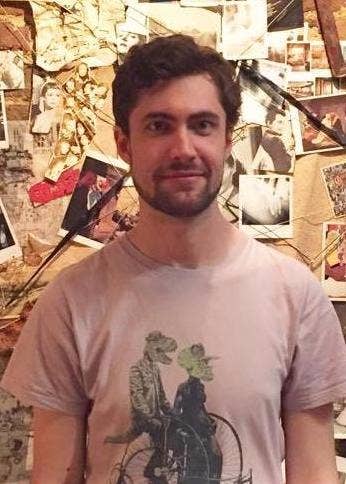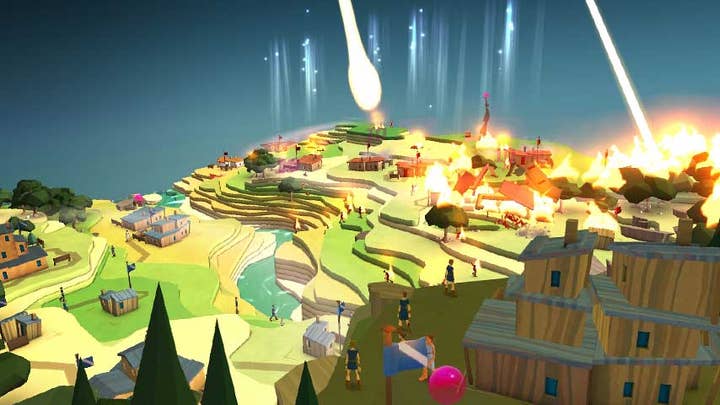"Why am I even making games?"
Flavourworks founder and Molyneux protegé Jack Attridge discusses the challenge of starting his own studio, and why he feels games design is stagnant
Jack Attridge is perhaps not the best known name in games design. At least, not yet.
Nevertheless, his resumé makes for impressive reading. After a stint at Mind Candy providing the audio for global phenomenon Moshi Monsters, he branched into a broader role at 22Cans - the independent studio founded by long-running games developer Peter Molyneux.
The Fable creator took Attridge under his wing, making him a vital cog in the machine that produced Curiosity: What's Inside The Cube and Godus. Attridge learned much, and quickly, but controversy over Godus' shortcomings - plus his own growing desire to try something new - led him to depart the studio. Two years ago today, he formed his current company: Flavourworks.
Attridge will be one of the many industry experts speaking at Nordic Game Conference as part of a track curated by GamesIndustry.biz. Ahead of this, we caught up with the designer-turned-business-owner to find out what he's been working on and why he left the tutelage of an icon such as Molyneux.

"At 22cans, I was intimately involved with design but not leading the final direction of the projects," he tells GamesIndustry.biz. "I could only advise.
"However, in that situation the worst thing you can do is go against the creative direction, so you can only support and realise the vision - especially with someone like Peter who can often surprise you with a novel solution. Ultimately, the experience really gave me the urge to act on my own ideas. Then around that time I walked into an Immersive Theatre show in London called The Drowned Man."
The production proved to be a revelation for Attridge. With a cast of nearly 40 actors, The Drowned Man allows its audience to explore the sets and watch the drama unfold first-hand, rather than viewing it from a distance in an auditorium. Attridge found himself bowled over by "the smells, the temperatures, the intimacy, the touch, and the authenticity" of being in the centre of a story rather than detached from it - and it led to an epiphany.
"I could talk forever about it, but the important point is that it woke me up and made me question: why am I even making games?" he recalls.
"The Drowned Man was so impressive, I can't think of another single instance where inspiration has hit me so hard"
"The atmosphere and tone really planted a seed in my mind that married with an old idea I had over a decade ago. [The show] was so impressive, I can't think of another single instance where inspiration has hit me so hard - except maybe the original Metal Gear Solid. I just knew that now I had been reminded of what a great experience could be, I needed to act on it."
Far from abandoning games and starting up his own acting troupe, Attridge pondered why he had become so disillusioned with games development and why he believed the medium was "starting to lose that spark". He concluded that game design was becoming increasingly stagnant and only the promise of new technologies - or anything that can be viewed as much as a novelty as an innovation - was stirring people's interests. Attridge was determined to find another way.

"A big part of what has got everyone obsessed with VR is just an urge for something new," he says. "For us it was a more interesting challenge to find that innovation within an existing install base, and once more to broaden the audience for games without leaving existing gamers behind.
"As an industry we are often too guilty of designing for ourselves, and that's always going to keep the barrier to entry high for newcomers"
"As an industry we are often too guilty of designing for ourselves, and using existing game conventions as crutches, and that's always going to keep the barrier to entry high for newcomers. The easiest thing a developer can do is place a 3D cube in Unity and make it move around, but even that basic step funnels your experience into being somewhat about the mastery of 3D space, and that concept alone could immediately be a core idea that just doesn't appeal to a lot of potential new gamers. We've tried to think differently about things on even the most foundational level in our designs, our technology, our processes, and even our aesthetics."
Hence Flavourworks, a company dedicated to creating something that aims to shake up the concept of game design. This 'something' has only been shown to a select handful of publishers, investors and journalists (GamesIndustry.biz included), such is the level of secrecy Attridge hopes to maintain. All he is willing to say publicly at this stage is his team is "focusing on narrative experiences".
"We spend a lot of time thinking about the common discussions around the genre like ludonarrative dissonance as well as many subtler aspects," he elaborates. "Much of our development time goes into making story and design feel inseparable rather than if they were two individual departments. We knew we didn't want to do pastiches of existing TV and film moments or genres as games so often are, and it has been reassuring to see the success of fresh titles like Firewatch or Inside whilst we've been in development.
"The most obvious opportunity we have in telling stories in a new way is through our in-house technology. It sounds absolutely bonkers to build our own engine when you're a startup, especially in the age of Unity and other engines. For the experiences we wanted to make, it was a necessity to make the standout experience we wanted. In the long run this has given us a platform with which in the future we can make many experiences in a shorter amount of time and for multiple platforms. Now that we have it singing, it has proven to have been an invaluable asset and a sound strategy for the company. However, none of that matters if we don't tell good stories, and that's the biggest opportunity of all."
The team is working as hard, if not harder, than most start-up studios - that becomes immediately clear when you understand the full production process of Flavourworks' debut game. But it's that effort that Attridge believes will help improve their chances of success. In an age of countless indies and start-ups vying for attention, simply being a plucky young team is no longer enough.
"As a new small indie dev turning up to a sea of indie devs, we knew we would drown if we weren't bringing something new to the table"
"As a new small indie dev turning up to a sea of indie devs, we knew we would drown if we weren't bringing something new to the table," he says. "I worry about a lot of indies that feel underprepared when needing to standout with their game, because they may be so passionate about it but they haven't considered the business realities, which people often don't realise is a huge part of the creativity of making a game.
"We are basically competing with the blockbuster AAA titles, and we can't expect to be accepted differently by consumers for being an indie darling. So coming out of the gate we knew we had to have something unique enough that we could compete with the big developers in terms of offering an experience worth people's time."

Fortunately, Attridge and a number of his staff gained experience during their time at 22cans, learning not only from the ambitious visions of that studio's founder but also the outcry surrounding the once highly-anticipated Godus.
"I had a great vantage point being able to sit on the armrest of a veteran," says Attridge. "Often it was advantageous for spotting issues that are a lot harder to prioritise focus on when you're in the driving seat of a game and a business. That's something I can sympathise with now.
"From day one, we had a full prototype that everyone was screaming at us to show off, but we'd been burnt from the changes Godus went through"
"But from the day I left I said, 'We won't say anything that we can't show'. The annoying side of that was that from day one, we had a full and very polished prototype that everyone - including journalists - was screaming at us to show off, but we'd been burnt from the publicly radical changes Godus went through, which let people down. In hindsight, we probably could have shown off what we had back then, and there's always the fear that people will assume we've just copied from titles that have launched in the time we've been in hiding, but that stuff will drive you crazy if you dwell on it."
Fortunately, the remarkably amicable split from 22cans proved to be invaluable. Once Attridge and his Flavourworks colleagues had handed in their notice, Molyneux actually approved and encouraged them to work on their prototype in the evenings - something other studio heads would have worked tirelessly to prevent. This minimised the risk when reaching out to publishers and investors, as the Flavourworks team already had a working concept demo of their ambitious game.
In fact, the relationship between Attridge and Molyneux is still strong: "A month or two after I left, he heard we were quickly getting interest from investors. He teamed up with Ian Livingstone and invited us back to meet with them. Five minutes after showing them the game they offered to invest and that got us off the ground at the start. Ian is now also our non-exec chairman."
While Attridge remains focused on the design and production of his new game, he has learned many of the hard lessons his former mentor encountered after founding 22cans: the intricacies of running a business.
"Hiring is the trickiest thing," he says, when asked about the biggest challenge he has faced. "Especially when you have no track record, have not announced your game, require a really specific kind of talent, and can't afford to compete with the benefits you get with a job at the giant success stories.
"The people that have come on board see the potential of what we are doing, want to be a part of something different, at the start of something new, and have that something special that keeps us aiming high. C++ programmers have been particularly hard to find, and we're still looking."
Jack Attridge is just one of the many speakers lined up for the GamesIndustry.biz track at this year's Nordic Games Conference. The event runs from May 17th to 19th.
